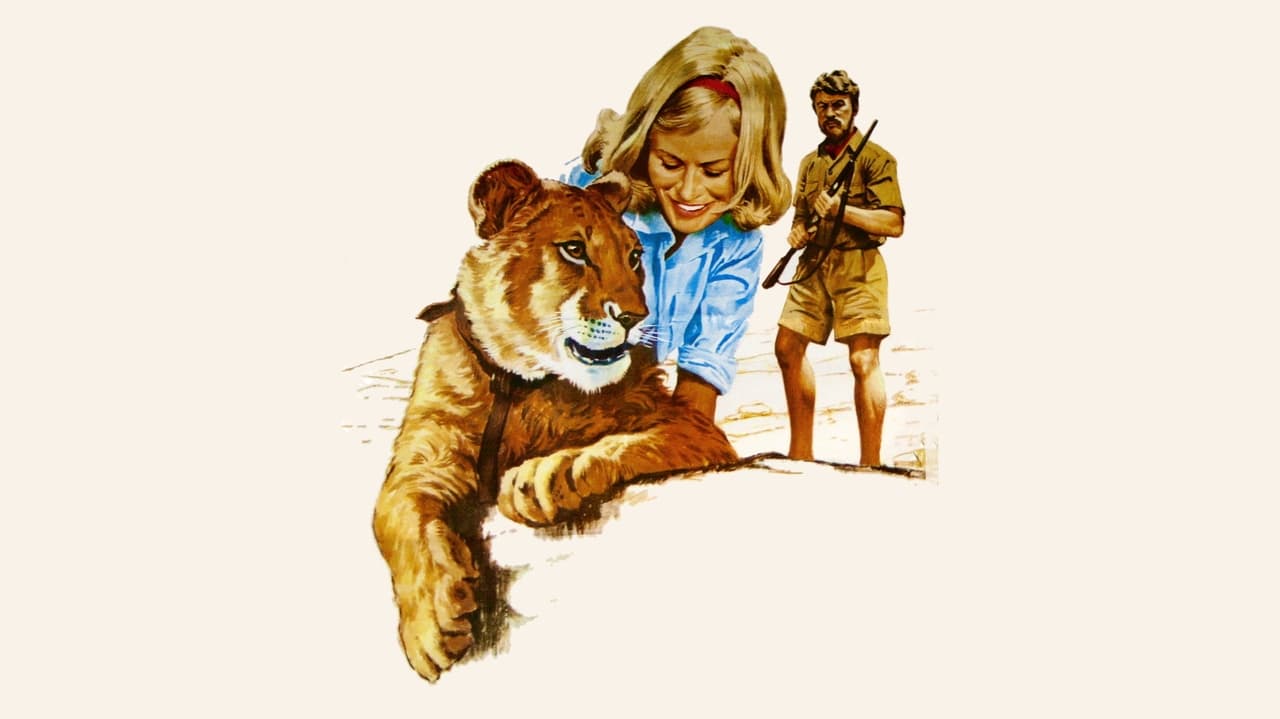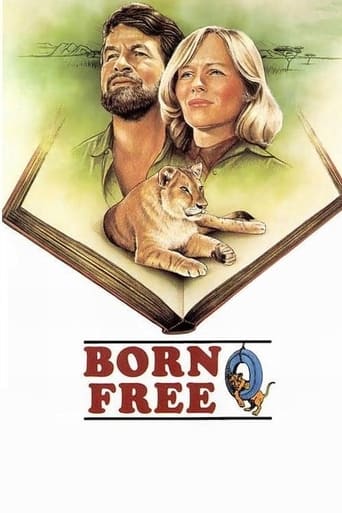

BORN FREE tells the story of Joy and George Adamson, a married couple who raised a trio of lion cubs in Kenya before attempting to release one of them back into the wild. Much like many of these "nature" films of the '60s and '70s - many of them invariably starring Bill Travers - this is heartwarming and naturalistic, with a slim story built around raw footage of the animals playing.The film is engaging and heartfelt, and many viewers will instantly fall in love with Elsa, the plucky young lioness who tries to adapt to life in the wild after being brought up by humans. Travers and McKenna are excellent as the human characters in the drama, but really, given the subject matter, this would have been a hard one to get wrong.
... View MoreBorn Fee may be the greatest and most beautiful animal film ever created! It is the true story of Elsa, the lioness whom a Kenyan couple, George and Joy Adamson, raise as a cub, take in as a pet, when George is forced to shoot Elsa's Mother in self defense as she charges at him. Shortly afterword, George leans that the reason why the Mother lioness tried to attack him, she was protecting her cubs.The Adamson's take in the entire liter of three cubs and grow very attached to them. When the cubs are on the screen, the emotional bond that the viewer feels is unforgettably blended with the beautiful backdrop of Africa scenery. Filmed in Kenya, where the real story happened, the Cinematography and music are spell-bounding! You really feel drawn into the lives of the couple and the lion cubs, and especially Elsa! Joy becomes most attached to Elsa, the smallest of the liter. When the other cubs become too difficult to manage, in a heartbreaking scene, they are sent to a zoo. George and Joy decide to keep Elsa. However, as she matures, the couple's friends and villagers become concerned, because Elsa has been frightening off villagers and livestock. The couple are dedicated and determined that Elsa would never be happy in a zoo or any other captivity environment, as Joy through tears says, "She was born free, she deserves to live free!" The couple than must do what has never been done before. Take Elsa from a domesticated pet and train her how to be wild. They spend hours, months, teaching her how to hunt, deal with conflict, and courtship. This film tags at the heartstrings big time, because there are scenes where she chases the truck after they are forced to leave her alone for the first time and she starts chasing the truck. Or the heartbreaking scene where she comes back to George and Joy's camp starving or hurt because she hasn't yet learned how to take care and hunt for herself.Finally, after Elsa kills a warthog, the Adamson's learn that she can be on her own. The movie ends with George and Joy reuniting with Elsa and her own family of cubs in a beautiful mountainous, hillside view, with the unforgettable title tune by Matt Monro that will send emotional chills up your spine and bring tears to your eyes. This is a landmark film that is flawless! A beautiful film for families and children to learn about the importance of kindness to animals and the difficulty that it can take making a wild animal into a domestic pet.Tragically, the real Elsa only lived about five years. She died of what appeared to be a severe tick disease similar to what is called "animal malaria." The work of Joy and George Adamson's devotion to protecting and preserving animal life remained for many years after Born Free. They showed that animals were just as important to be card for and loved as humans and that human contact and compassion with them can create a bond, lasting a lifetime.However, in 1980, Joy Adamson who was known to be very forceful and demanding with her camp staff, was tragically found stabbed to death near her camp. Originally, authorities belied that she had been mauled by a lion, but the autopsy reports showed that her wounds were not consistent with an animal attack. The story is that a disgruntled worker, alleged that Joy had not paid him for two weeks, and they got into a fight. He alleges that Joy shot at him but no evidence has surfaced to support this. Angered over not being paid, he stabbed her to death and was sentenced to life in prison, escaping the death penalty by hanging,since Joy's attacker's age could not be proved, the judge sentenced him to life in prison.George Adamson suffered a similar tragic fate when in 1989 he was shot to death by poachers who were attacking a tourist who had been visiting him. George was able to save the life of the tourist, in an incredible heroic effort for an over 80 year old man! However, George himself did not survive the shooting. In news that shattered hearts around the world, both he and Joy died terrible, painful, and senseless deaths.However, their love and devotion to animal preservation and support was so internationally impacted, that many wildlife preservation societies today are a result of their work. Film stars Virgina McKernna and Bill Travers, the real-life British couple (the real life Adamson's were not British) who portrayed the Adamson's in the movie helped establish the Born Free Preservation Society in 1984. Working with the Adamson's on the set of Born Free so moved Virgina and Bill that they continued to work with helping wild animals. Bill did it for the remainder of his life and Virgina is still active in wildlife preservation to this day.Born Free, is a movie, an experience, and a song, that will move you for the rest of your life!
... View More1st watched 9/4/2007 - 7 out of 10(Dir-James Hill): Fascinating study of lioness born free, but domesticated; then being trained to survive again in the wild. This is a unique film in that it deals with some real issues about making a wild animal a pet and the effect on it because of that. The movie begins with an African game warden, played by Bill Travers, killing an adult lion that is attacking humans but leaves behind three pups. The game warden and his wife, played by Virginia McKenna, decide to take in the pups since they lost their parents and would eventually starve to death in the wild. They are finally able to get them to feed off of their homemade formula and grow, but when it comes time to release them back to the wild the wife's attachment to the smallest that she named Elsa, has grown and they decide to keep her. Elsa quickly becomes their pet and attaches herself to them, but they know eventually she'll have to leave. They avoid the issue of sending her to a zoo because they want Elsa to be free, but then they must take on the challenge of re-training her for the wild. This turns out to be harder than they expected and their trials with this becomes the subject of the rest of the movie. This is all very well done and helps us realize the difference between pets and animals living in the wild and shows us the respect we should have of the differences. There is a good balance of sentimentality with reality as this couple thinks hard about every decision it makes thinking not just for themselves but for Elsa. This a unique movie that can be enjoyed by persons of all ages and also teaches us some things that we rarely see on film.
... View MoreA true story set in the African wild which plays like a wildlife fantasy: childless couple working in Kenya (he's a game warden who hunts ferocious animals) adopt three orphaned lion cubs and rear them like babies. When they start growing and becoming a household nuisance, two cubs are sent to a zoo but the runt of the litter stays with the couple--growing particularly close to the wife, who soon finds it hard to let go emotionally when the cub turns into a lioness and is ready for mating. Sloppily-made family film from a best-selling book isn't particularly expressive; director James Hill has no headier goal than to make this a heart-tugger, one designed to inspire lots of "aww"s from the impressionable. Yet the humans at the center of the story are benign and one-dimensional--they're just good-hearted people who seem to love overgrown kittens--while the wife's voice-over is in the spirit of a bedtime story (with careful warnings of what's coming up next). The photography is uneven and there isn't much excitement from the animals; Hill is so heartfelt and sentimental, he's turgid. Audiences were drawn to the heavily prevalent theme of letting loved ones go, making the film an effective tearjerker for kids and the young at heart. Hill received a nomination from the Director's Guild (!), while composer John Barry won Oscars for his score and for the popular title song, co-written with Don Black. **1/2 from ****
... View More